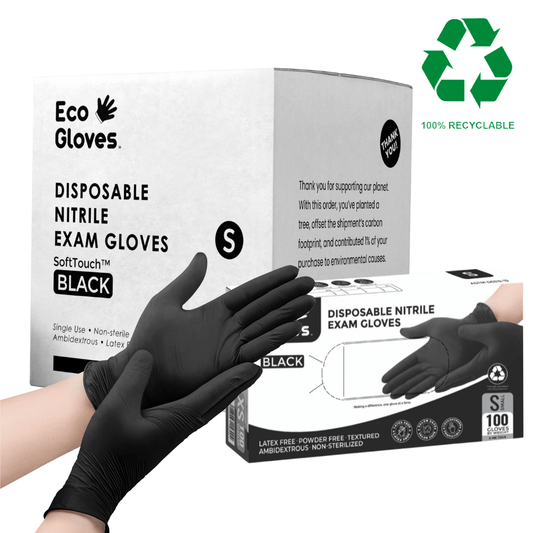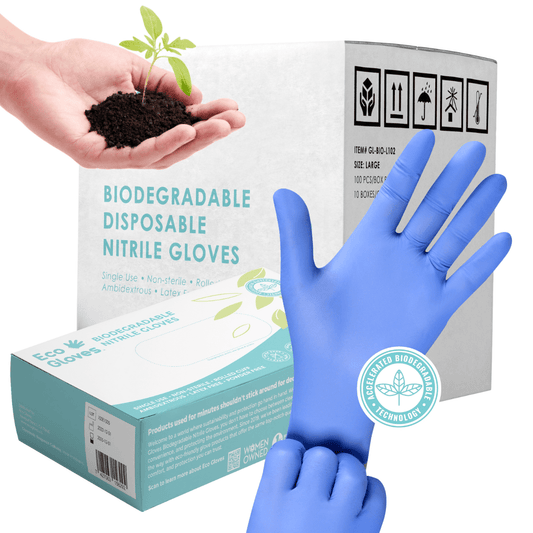Reducing Environmental Impact in In-Home Care: Tips for Caregivers
Eco Gloves
Challenges in Creating a Sustainable Home Care Environment
Home care providers face several obstacles when trying to implement sustainable practices, such as improving energy efficiency, conserving water, and reducing waste. However, these challenges can be addressed through thoughtful planning, staff education, and the adoption of greener products and procedures. By incorporating sustainability into in-home care, caregivers can reduce their carbon footprint without sacrificing the quality of service they provide.
Reducing Disposable Waste in Home Care Settings
In-home care often generates significant amounts of disposable waste, particularly from gloves, masks, and packaging materials. This waste, if not managed properly, can have a detrimental effect on the environment. To mitigate this, caregivers can switch to more eco-friendly alternatives like compostable or biodegradable gloves and other products. Additionally, where possible, using reusable items like washable aprons or towels can significantly reduce the volume of waste sent to landfills. Small changes in daily operations can have a large impact over time.
Adopting Eco-Friendly Products
Use of environmentally sustainable products in caregiving not only assists in the conservation of the environment, but also enhances the quality of services to be rendered and improves the morale of the staff and patients alike. Non-toxic cleaning agents, for example, are safer for clients, particularly those with allergies or respiratory conditions. These products can create a healthier living environment, while also reducing exposure to harmful chemicals. Eco-friendly options can also help lower utility costs, contributing to both environmental conservation and financial savings.
Recycling and Sustainable Measures
Recycling is a simple yet effective way for home care providers to minimize their environmental footprint. Caregivers can recycle materials such as packaging, paper, and even some types of medical waste, provided it’s sorted and disposed of according to medical recycling guidelines. Using energy-efficient items, including light bulbs and appliances, also extends the use of resources in the home. These small adjustments help home care providers exercise responsible stewardship and promoting their sustainability agenda.
Safe Practices for Medication Disposal in Home Care
Following proper guidelines for medication disposal is essential for safety. Improper disposal can harm the environment and create risks for others. Promptly and correctly dispose of expired or unused medications to prevent accidental ingestion.
Leftover medications should be taken to a medication take-back program or, if disposed of in the trash, mixed with substances like coffee grounds or kitty litter to discourage retrieval and misuse.
Green Building and Energy Management Systems
Another impactful solution is implementing green building and energy management systems within home care facilities. For example, incorporating solar panels, energy-efficient lighting, and smart thermostats can help reduce energy consumption. Encouraging the use of eco-friendly materials in renovations or new constructions, such as low-VOC paints and sustainably sourced furniture, also supports a greener environment. Furthermore, establishing a culture of sustainability among staff by providing training on energy conservation and waste reduction practices can create lasting changes that reduce the environmental burden of home care operations.
Conclusion
Sustainability and high-quality patient care are not mutually exclusive. In fact, they often support one another. Adopting eco-friendly practices in home care not only reduces environmental impact but also enhances the well-being of both patients and caregivers. Sustainable practices can also lead to cost savings, improving the financial viability of home care agencies while boosting their reputation among environmentally conscious clients.
By investing in eco-friendly initiatives, elderly care providers can lower operational costs while enhancing their brand image, attracting new clients, and strengthening relationships within the community. In doing so, they ensure a healthier future for both their patients and the planet.


















